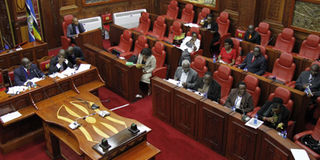EAC reels as claims of misconduct at headquarters arise

The EALA Assembly in session: A section of regional MPs is unhappy with the business at the headquarters. PHOTO | FILE |
What you need to know:
- Last session in Zanzibar treated to motion seeking suspension of hiring secretariat citing graft and favouritism.
A battle is brewing within the East African Community, pitting the region’s Secretariat against its parliament amidst allegations of misconduct.
In its just-concluded session in Zanzibar, the East African Legislative Assembly (EALA) went after the bloc’s staff, calling for suspension of ongoing recruitment, pending investigations.
Kenyan EALA member, Mr Abubakar Ogle, tabled the motion to suspend hiring of new workers following allegations of corruption and favouritism.
“There was talk about corruption, underhand dealings. There were claims of inequity in recruitment,” said Mr Ogle in an interview with Smart Company.
Following concerns on transparency of the Community’s hiring processes, a consultancy firm was engaged in 2014 to vet candidates for key jobs.
However, earlier this year a commission comprising representatives from member countries was set up to deal with recruitment as the bloc readied itself to replace 50 staff on the verge of retirement.
EALA’s move against Community’s secretariat came a week after parliament raised the alarm on a cash crisis that was paralysing operations.
According to some members, EALA’s cash and recruitment crises are directly linked by the ineffectiveness of the secretariat.
“The secretary general is the accounting officer of the community and subject to the vision of the council of ministers. I am finding him at fault,” said EALA member, Mr Fred Mukasa.
Mr Mukasa says Mr Libérat Mfumukeko, who took over the role of EAC secretary general earlier this year, needs to take on a more proactive role in ensuring that member states meet their financial obligations to the community. He also needs to increase the transparency at the Secretariat.
In response to EALA’s concerns, the secretary general said he had written to the legislative assembly’s speaker so that “investigations can begin immediately” into the recruitment processes of his office.
These arising issues, particularly the non-payment of fees by partner States, raise questions about commitment to the dream of seamless movement and trade within a borderless community.
Some of the fears are confirmed in a new report that assesses the implementation of the measures to ensure freedom of movement for goods, capital and services.
According to the Common Market Scorecard 2016, the region is lagging in self-imposed targets for the implementation of the Common Market Protocol.
EAC officials say although overall compliance with the protocol has fallen to 59 per cent from 63 per cent in 2014, numerous barriers to trade persist while some new ones have been erected.
In addition, national policy across the region continues to be disjointed, sometimes going against the spirit of integration.
“Governments in the region instead of concentrating on harmonising and implementing the EAC policies, they are coming up with new policies at the national levels that are contradicting the policies which have already been agreed upon and signed,” said the EAC deputy secretary-general for Productive and Social sector, Ms Jesca Eriyo.
Specifically, the report found that only two of the 20 operations that facilitate deeper financial integration were free of restrictions in all of the EAC Partner States; that regional trade in goods was constrained by no less than 51 non-tariff barriers (NTBs) and that 63 non-conforming measures slow down trade in the service sector.
“This remains an impediment to attracting region-wide foreign direct investment (FDI) and to the region more fully participating in global value chains,” reads the report in part.
These restrictions mean that EAC investors are not guaranteed smooth going when they decide to put money in a neighbouring Community partner states.




